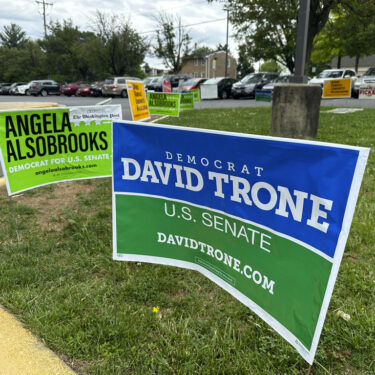WASHINGTON (AP) — The Associated Press declared Democrat Angela Alsobrooks and Republican former Gov. Larry Hogan the winners in their primaries for the U.S. Senate in Maryland on Tuesday.
The race is expected to be competitive in November, when Hogan will try to become the first Republican from Maryland to win a U.S. Senate seat since 1980. If Alsobrooks wins this fall, she would become the first Black U.S. senator in the state’s history.
The AP only declares a winner once it can determine that a trailing candidate can’t close the gap and overtake the vote leader.
Here’s a look at how the AP called these races.
U.S. Senate from Maryland, Democratic primary
Candidates: Prince George’s County Executive Angela Alsobrooks, U.S. Rep. David Trone, eight others
Winner: Alsobrooks
Called at: 9:55 p.m. ET
Poll closing time: 8 p.m. ET
About the race: Alsobrooks and Trone were in a competitive race for the Democratic nomination to replace Democratic incumbent Ben Cardin, who is retiring after three terms.
The contest pit candidates from the state’s two most populous counties: Montgomery and Prince George’s. Trone represents the northern portion of Montgomery County in Congress, along with all of more conservative western Maryland. Alsobrooks is the chief executive in Prince George’s County, the state’s second most populous county and the county with the highest share of Black residents in the state.
Trone is co-founder and co-owner of wine retailer Total Wine and poured more than $61 million of his own money into the race, far outspending Alsobrooks.
Much of the state’s Democratic establishment has rallied behind Alsobrooks, namely Gov. Wes Moore, U.S. Sen. Chris Van Hollen and almost all of the state’s U.S. House delegation.
Why AP called the race: Alsobrooks was leading Trone by almost 9 percentage points statewide, with partial vote results in from every county in the state, when the AP called the race.
To win, Alsobrooks needed to run up the vote in her home county of Prince George’s, while limiting Trone’s expected lead in his home county of Montgomery. Initial vote results showed Alsobrooks doing exactly that. She had built almost a three-to-one lead in Prince George’s County when the race was called, while holding Trone to the narrowest of leads in Montgomery, where he would have needed a lopsided victory.
Within 30 minutes of the race call, Alsobrooks overtook Trone for the lead in Montgomery. Alsobrooks had a big statewide lead over Trone in votes cast on primary day and a narrow lead among votes cast by mail or in-person before primary day. Trone was ahead comfortably in western Maryland, but had a much narrower lead on the Eastern Shore. But his leads there were not enough to offset Alsobrooks’ early leads in Prince George’s as well in Baltimore City and Baltimore County, where the large amounts of outstanding ballots were also likely to favor Alsobrooks.
U.S. Senate from Maryland, Republican primary
Candidates: Former Gov. Larry Hogan, former state Rep. Robin Ficker, five others
Winner: Hogan
Called at: 8:38 p.m. ET
Poll closing time: 8 p.m. ET
About the race: Hogan’s late entry into the GOP primary gave his party a rare pickup opportunity in a usually reliable Democratic state. The two-term governor has been a vocal critic of former President Donald Trump and briefly flirted with a presidential bid last year. Hogan’s opposition to Trump might appeal to moderates and independents in the general election, but it could have created an opening for a candidate from the right to win over Trump supporters in the more conservative corners of the state. Ficker was Hogan’s chief opponent for the GOP nomination. He’s a former state representative, a recently disbarred attorney and frequent candidate. Before Hogan entered the race, Ficker had the biggest war chest of the rest of the Republican field. He has also run television advertisements aligning himself with Trump and his policies.
Why AP called the race: At the moment the AP declared Hogan the winner in the GOP primary, he led Ficker by about 67% to 25%, with most of the state reporting partial results. Hogan more than doubled Ficker’s performance in central and more conservative western Maryland, as well as on the Eastern Shore. Those areas were Ficker’s best chances of winning over Trump supporters who might have been alienated by Hogan’s opposition to the former president.
Ficker led Hogan in some of the counties Hogan lost in his successful 2014 primary bid for governor, such as Somerset, Dorchester and Garrett, but not by nearly enough to offset Hogan’s leads elsewhere in the state.
In the more populous areas of Prince George’s county in the Washington suburbs and in Baltimore City and Baltimore County, Hogan more than tripled Ficker’s vote totals at the time the race was called. Montgomery County, also in the Washington suburbs, had not reported results at the time the winner was declared, but by 9 p.m. ET, Hogan had more than quadrupled Ficker’s vote total in the state’s most populous county. These are some of the most Democratic-friendly counties in the state, where more moderate voters helped propel Hogan to his gubernatorial primary victory in 2014. Hogan was also far ahead of Ficker both among votes cast before primary day as well as votes cast in-person on primary day, and those leads have grown since the race was called.
Associated Press reporter Maya Sweedler contributed to this report.



